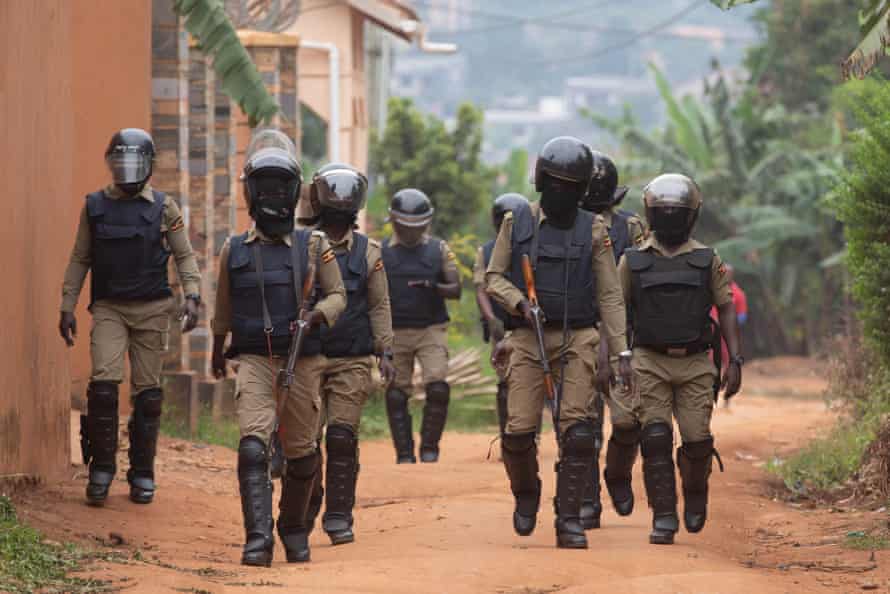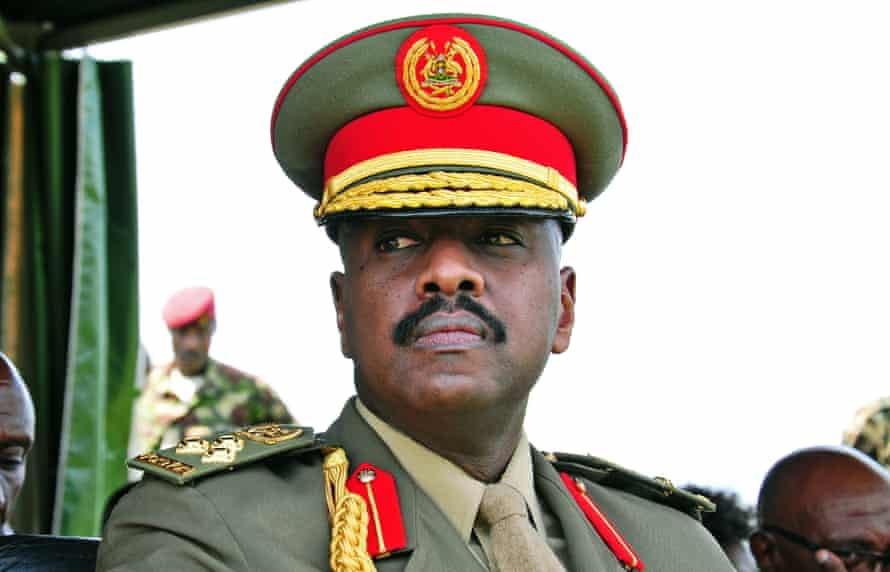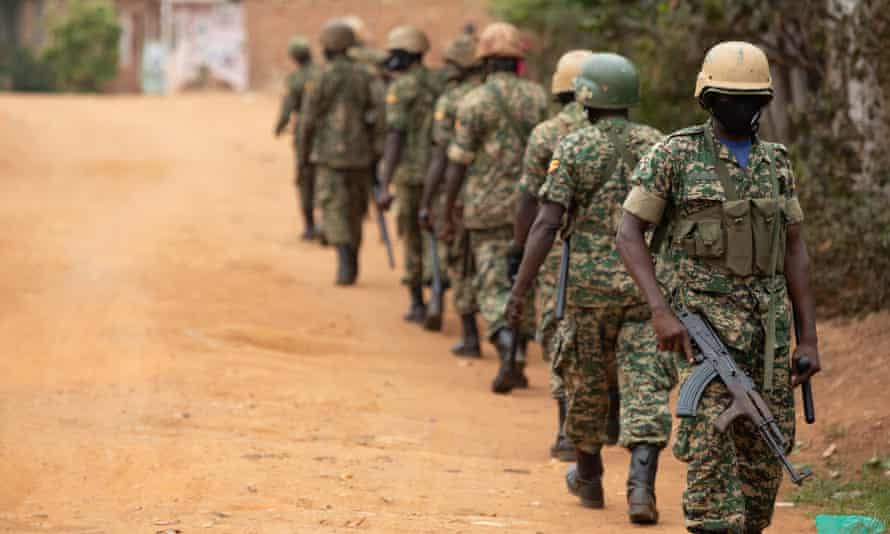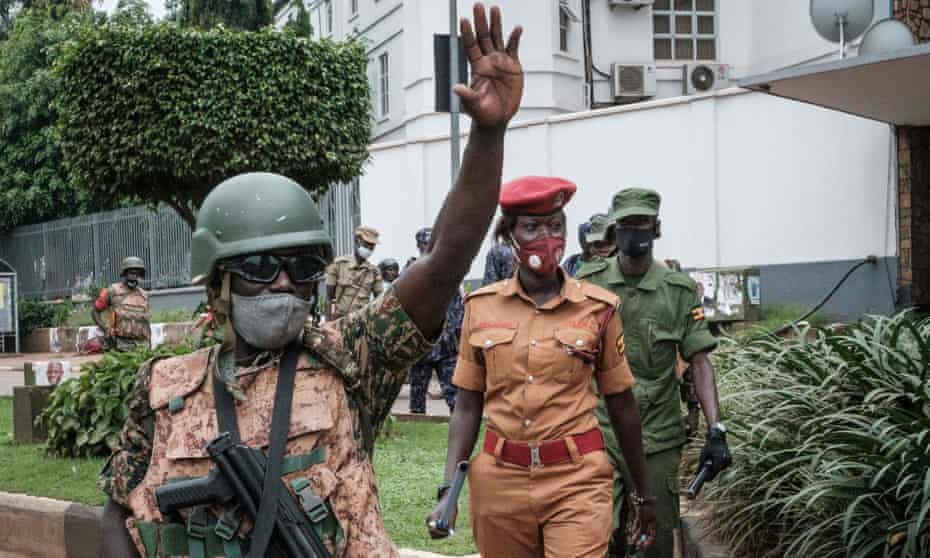
By Jason Burke
Monday May 3, 2021
Muhoozi Kainerugaba leads Special Forces Command, an elite military unit blamed for widespread abuses

Security forces block the entrance to Robert Kyagulanyi’s property in Kampala in January. Photograph: Luke Dray/Getty Images
Lawyers acting for the victims of a wave of abductions and torture by security forces in Uganda have named senior military commanders, including the president’s son, in a complaint to the international criminal court.
Prosecutors at the ICC are already reviewing an earlier submission from the opposition politician Robert Kyagulanyi, the former reggae singer known as Bobi Wine, describing widespread human rights abuses before presidential polls held in January.
President Yoweri Museveni claimed victory in the vote, which was marred by allegations of fraud and the death of at least 50 people during protests. Most were shot by security forces.
Kyagulanyi’s National Unity Platform party has listed more than 600 members and activists said to have been detained. NUP officials believe the true figure is likely to be higher.It has been difficult to identify the masked men or vehicles used in the abductions as well as torturers and guards in prison. However, lawyers, campaigners and victims blame the Special Forces Command, an elite military unit, for many of the abuses. The new complaint, also filed on behalf of Kyagulanyi, will be submitted to the ICC this week.
The SFC is commanded by Museveni’s son 47-year-old son Lt Gen Muhoozi Kainerugaba, who is named in the complaint along with several senior officers.
“In Uganda today, the civil function is subverted in favour of the military that patrols all towns and cities,” the complaint alleges. “The military maintains power of arrest over civilians who are held on vague and indeterminate charges.”

Lt Gen Muhoozi Kainerugaba, Yoweri Musevni’s son and commander of the SFC. Photograph: Peter Busomoke/AFP/Getty Images
The complaint describes hundreds of abductions. Some detainees have had their joints or genitals beaten with wires, have been burned with cigarettes or had fingernails torn out. At least one detainee has been confirmed as having died in custody, although the death toll is thought to be much higher. Many of those abducted have suffered significant and potentially lasting physical and psychological harm.Ugandan military spokespeople have repeatedly denied responsibility for any abuses, and Museveni in a national address in February dismissed allegations that his forces had illegally detained civilians, saying the army was “a disciplined force” and that his party “does not kill” its opponents.
Maj Jimmy Omara, a spokesperson for the SFC unit, told the Guardian the allegations against the unit and its commanders were baseless. “There are no abductions. These are normal arrests. Operations here are managed and controlled by the police force so I don’t see where the SFC would be involved,” he said.
However, in a letter dated 23 February that was sent to the Monitor newspaper, Museveni stated that the SFC had held more than 50 civilians without charge since November. Those held “have been with SFC, helping them to expose the whole criminal scheme of elements of the opposition plus their local parasite and foreign backers,” Museveni said.
The 76-year-old authoritarian ruler, who has been in power since 1986, also acknowledged that he had reinforced security ahead of the elections by deploying special forces who “killed a few” people he described as terrorists.
“Because of misbehaviour and plans to stop the elections, the security forces deployed heavily. In the case of Kampala, we brought in a commando unit that had been exemplary in Somalia. They killed a few terrorists who were here,” he said.
On 4 March the minister for internal affairs, Gen Jeje Odongo, told the parliament that 177 people were in detention on military charges and in military custody.

Security forces on patrol in Kampala. Photograph: Luke Dray/Getty Images
The allegations will draw attention to the longstanding relationship between the military and western powers, which have seen Uganda as a loyal ally in a volatile region.The Special Forces Command was set up in 2011 and trained in 2014 and 2015 by US Navy Seals. Muhoozi was its commander at this time. The training covered close-quarters combat, sniper operations and combat casualty care, among other topics.
The unit was then sent to Somalia as part of Amisom, a multinational force deployed by the African Union to fight Islamic militant insurgents. “The people we are dealing with in Somalia … they have trained in Afghanistan, Iraq and Yemen, so you need people who can fight behind the lines,” Omara said.
Some special forces troops were brought back to Uganda before campaigning began last year for the January elections and, opposition officials say, deployed to intimidate Kyagulanyi’s supporters and activists before, during and after the poll.
After stepping down to serve as national security adviser in 2017, Muhoozi was reappointed commander of the SFC in December, a move some critics said signalled a possible escalation of opposition harassment. He is also a presidential adviser on special operations.
Lawyers acting for Kyagulanyi say the abuses amount to systemic violations of international human rights law.
Bruce Afran, the US-based lawyer who has drawn up the new complaint on behalf of Kyagulanyi, said: “Our request is for [Museveni’s] son to be charged. [Muhoozi] Kainerugaba is the commander of the Special Forces Command, the unit that Museveni himself identified as involved [in the abductions], and as such is responsible for their actions. He can’t just hide under the principle he was carrying out an order.
“The consistent playbook is that they hold these people and eventually some make statements that are false under duress.”
Cases listed in the complaint include that of a 75-year-old woman, Regina Namukasa, who reported that her three sons were picked up for unknown offences by plainclothes operatives on 6 January, and Jolly Jackline Tukamushaba, 45, who was allegedly abducted on 10 January from her home and driven away in a pickup truck.

Officers patrolling in a street in a Kampala suburb before January’s presidential election results were announced. Photograph: Yasuyoshi Chiba/AFP/Getty Image
According to her daughter, Tukamushaba had put up Kyagulanyi campaign posters inside their house and was working at a local non-governmental organisation. The family reported the matter to police who said they had no information on her whereabouts.In another case, Ronald Ssegawa, 22, was found left for dead at a mortuary in Mulago in January but rescued by staff. His condition and injuries suggested he had been starved and electrocuted, and had had his nails removed and fingers broken, with one snapped off at a joint.
The US provides almost $1bn annually in development and security assistance to Uganda, and officials say Washington plays “a key role in supporting the professionalisation of the military”.
In 2018, US officials said the US embassy in Kampala had not worked with the SFC since early 2016 because of human rights concerns. This month the secretary of state, Antony Blinken, announced that visa restrictions would be imposed on those responsible for recent human rights abuses.
Uganda received more than £150m of British aid last year, the highest total for a decade, as well as funding for human rights training for police and the prisons service. The British government has said that though its armed forces continued to provide assistance to Uganda’s military, none had been given to the SFC.
The US has provided significant support for Amisom, and special forces and other units have worked closely with Ugandan and other troops. The Ugandans provide the largest contingent in the multinational force, with 6,000 troops stationed in Somalia.
A spokesperson for US Africa Command said it had conducted training engagements with Ugandan forces in 2014, 2015 and 2016 and that engagement with Ugandan forces in Somalia continued.